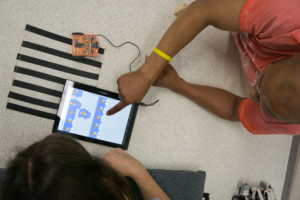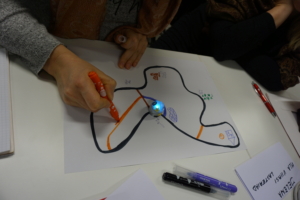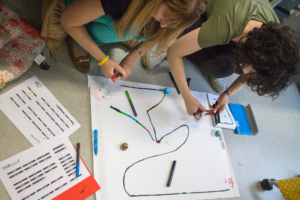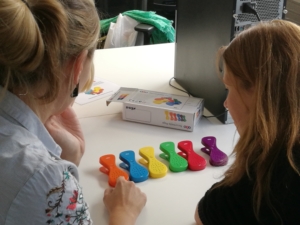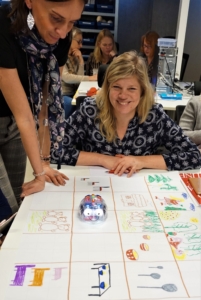Non-Degree / Dates: 20-24 July 2020
Educational robotics is a promising tool for bringing excitement, motivation and growth of mathematics and other STEAM skills into the classroom. However, a teacher needs solid proof that using educational robots in the classroom would improve students’ skills or that they would at least work as motivational tools. For this reason, the course covers at least 3 different age appropriate educational robotics platforms in a practical hands-on-workshops format.
No previous knowledge of robotics nor programming is needed to take part in the course. The crash course for programming the robots is included in the introductory part. Take a look at the trailer: https://youtu.be/
Take a look at example robotics worksheets:
LEGO WeDo 2.0 https://ggbm.at/te3xMzdk
Edison V2.0 https://ggbm.at/VysRxn2u
Robomath and the aim of implementing STEM and STEAM innovations and skills into classrooms is one of the focus areas of our brand new EDULAB, which aims to co-create educational innovations with Estonian schools. Read about what goes on in EDULAB here: https://edulabs.ee/
Why this online course?
Teacher(s)
Janika Leoste is an analyst in the Center of Excellence in Educational Innovation and a PhD student. As a robotics teacher-trainer for the last four years, Janika has been educating thousands of teachers about more than ten educational robotics platforms. In a experimental study lasting one school-year with more than 2000 students, she investigates, how educational robotics can be implemented in math lessons, and what are the teachers’ and students’ attitudes towards educational robotics as a learning tool.
Maire Tuul is a lecturer of Mathematics and Didactics of Mathematics in Tallinn University. Her main fields of research are renewed learning environment and application of curriculum in pre-school child care institutions. For Maire it is important that future teachers would recognize the potential of robotics for bringing diversity to the learning process and that they could expediently use modern technical means. She received her PhD in Educational Sciences from Tallinn University.
Tiia Õun is an Associate Professor at Tallinn University School of Educational Sciences and Acting Director of the School of Educational Sciences. She received her PhD in Educational Sciences from Tallinn University.
The course is organised together with teachers from Universidad Rey Juan Carlos (URJC), including Luis Pastor, School of Computer Science & Engineering.
The URJC is a multidisciplinary higher education institution created in 1996 as the 6th public university in Madrid. Even though it is very young, it has relevant achievements both from the academic and research points of view. The group collaborating with TLU is composed of faculty and officials from the Schools of Computer Science & Engineering and the School of Social Sciences (Education area). The group’s background is essentially multidisciplinary, having worked in different application domains such as Medicine or Education. Past activity includes subjects such as technology based education and training using virtual reality, haptics, mechatronics and robotics.

Timetable
Real time video lectures in Zoom (Ensure you have a stable and reliable internet connection). In addition, Google Drive ja h5p.org are also used.
NB! You will need a tablet for controlling the robots and a laptop with microphone and camera in order to take part in the course. Also, you need a bit space on the floor for moving the robots and some basic handicraft tools (paper, glue, scissors, magazine cutouts) for creating playful environments for the robots.
The training days include studying robots (BlueBot, Ozobot, Edison), co-creating a learning activity, testing and reflecting it. Also, it includes a lot of action on the floor with robots and having fun with virtual course mates.
Time Zone: UTC/GMT +3 hours (Check the time difference to your location)
Contact day
10:15-10:45 Warm-up and getting introduced with a new robot
10:45-11:45 Co-creating a learning activity in a small virtual group
11:45-12:00 Stretching pause
12:00-12:15 Introduction of created design and handing it over for testing to other team
12:15-12:45 Testing a learning activity created by another team
12:45-13:30 Reflection on results of testing. Wrapping up the day.
20 July Robots with factory programs and controller
21 July Button programmed robots
22 July App-programmed robots
23 July STEAM kits
24 July Putting all together. Creativity challenge
Participants
Active preschool or primary education teachers or BA or MA students in various fields in education or anyone interested in robotics in preschool or primary education. The course is limited to 30 participants
Credit points
Students who are present the whole course period and successfully complete their assignments to the leading lecturer by the date to be determine will be granted 2 ECTS.
Course fee
400 EUR
NB! The price includes also a set of robots that will be delivered to the participants. The price does not include the sending costs, as that depends on the country.
The set includes: Blue-Bot 2.0, Edison V2.0, Ozobot Bit Starter Kit, Voice Recording Peg, LEGO Education Duck.

